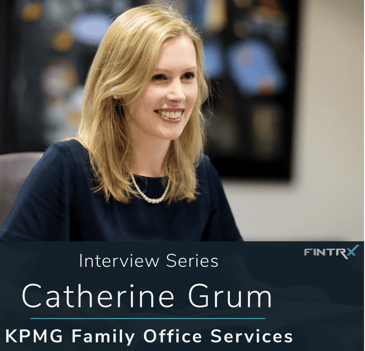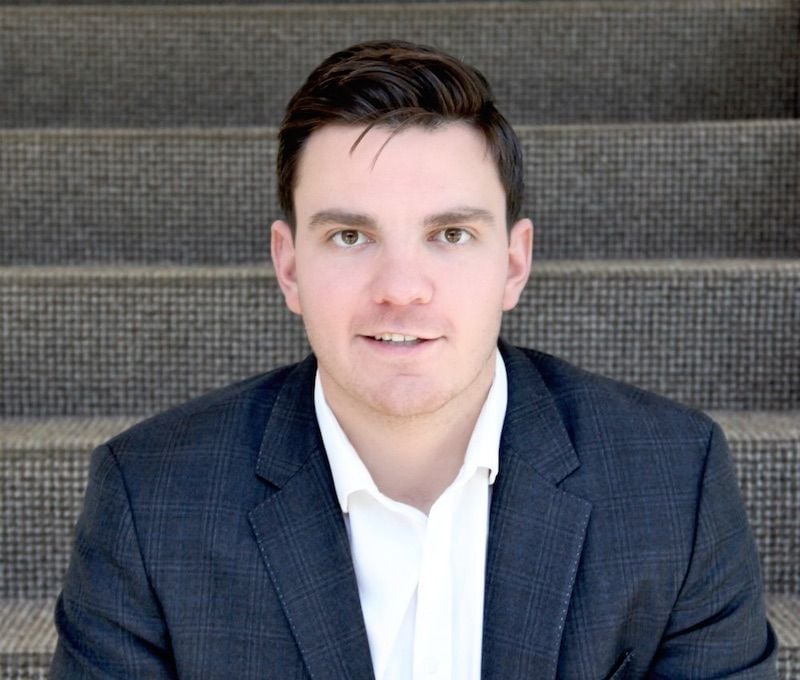START YOUR FREE TRIAL
GET STARTED
The Industry’s Most Trusted Private Wealth Data—Comprehensive, Accurate, and Current
Explore the leading platform used by asset managers to find and engage with RIAs, Broker-Dealers, Family Offices, Foundations & Endowments. Request your free trial of FINTRX now and see for yourself.
Blog & Resources
NEWS AND INSIGHTS FROM FINTRX
Interview with Catherine Grum, KPMG Head of Family Office Services UK
 We sat down with Catherine Grum the head of KPMG's Family Office Services based in the UK. Catherine assists enterprising families establish and run their family offices. Catherine acts as a sounding board and trusted adviser to family members and senior family office executives. Catherine has advised on the creation of family offices following the sale of a family business and the restructuring of family enterprises to separate out the family’s broader portfolio of investments from their operating business. She works closely with colleagues across the UK and internationally to help established family offices review their operations to improve efficiency, access to information and risk management. Catherine also provides support and advice in relation to their diverse portfolios of assets from transaction support and tax advice to access to new investment opportunities.
We sat down with Catherine Grum the head of KPMG's Family Office Services based in the UK. Catherine assists enterprising families establish and run their family offices. Catherine acts as a sounding board and trusted adviser to family members and senior family office executives. Catherine has advised on the creation of family offices following the sale of a family business and the restructuring of family enterprises to separate out the family’s broader portfolio of investments from their operating business. She works closely with colleagues across the UK and internationally to help established family offices review their operations to improve efficiency, access to information and risk management. Catherine also provides support and advice in relation to their diverse portfolios of assets from transaction support and tax advice to access to new investment opportunities.
Please introduce yourself, your background and tell us more about KPMG and what you do there?
I’m Head of Family Office Services for KPMG in the UK. I advise enterprising families on how to establish or evolve their family office. This can include thinking through the purpose of their wealth, what they need from a family office in order to achieve this and then, more practically, advising on the building blocks they need to implement their plans, from choice of location and resource requirements through to governance and structuring. I also help more established family offices access the full range of KPMG services they need from cyber security and corporate finance to UK and international tax support. My career has always been focused on working with families and family offices of all shapes and sizes. I began my career as a trust and estates lawyer but I have also spent time working in a large financial institution and then running a multi-family office before joining KPMG. This breadth of experience gives me a unique insight across the family office ecosystem and enables me to support clients through the process of working out how all the different components fit together.
What are some of the biggest challenges that most family offices face that you’re trying to solve for?
Often the families I work with have enjoyed significant success and the challenge they now face is to work out what this will mean for the next generations of their families. This can create a number of dilemmas such as how to provide a secure future for their children and grandchildren without making this so secure that they lose all motivation to make something of their lives themselves. The creation or formalisation of a family office is often one of the steps families take as part of their succession planning process. It can help to provide the family with a vehicle that will continue what they set in motion for future generations. However the act of creating a family office doesn’t provide all the answers by itself and this should be seen as part of an ongoing process. It can be tempting to jump into discussions about whether to use a trust or a company and who to appoint as investment manager. However the best results are usually achieved when time is given to consider the human aspects first, the family’s purpose and values. These will then set the context for the more technical considerations. Even families with long-established family offices often need to revisit these questions and make changes to reflect new circumstances or changing objectives, which is why I often talk about family offices evolving.
What are the top trends that you have seen emerging within the family office sector in 2019?
We have been undertaking some research this year to interview leading family offices which has provided some great insights. From this we can see that family offices are becoming more strategic in their approach. Historically, many family offices were established in something of a reactive fashion. A specific need is identified within the family and someone is then hired in response to this. The family go through a liquidity event and then appoint an investment manager (or two). What we are seeing much more now is that they are allocating time and resources to consider what their overarching objectives are and then aligning their business and operational strategies with these while competing more and more for investments and talent. They are also becoming more aware of the importance of culture and how this can impact everything from risk to retention.
Specifically in relation to their investments, we expect many of the more prudent family offices to be looking closely at their fund allocations. The amount of dry powder sitting in PE funds has already contributed to an increase in the multiples being paid for acquisitions and further investment in this sector is therefore likely to be on the back of careful due diligence and a flight to quality. For the small and mid-sized family offices this is not always easy to achieve in-house but there are increasing options available to outsource this support.
Finally, the topic of social responsibility comes up ever more frequently, whether this is in relation to their investment portfolios or the wider activities of the family. In the area of philanthropy, with social media continuing to highlight and amplify certain issues such as climate change, more families are looking to ensure that their activities and donations are actually effective and helping to achieve progress towards their intended goals. A theme that emerged from our recent Philanthropy conference was that families want to give better. This might mean spending time as a family to agree and align the particular issues and causes they want to support, developing a more structured selection process or getting more involved with their chosen recipients, lending a hand or tracking their progress.
What is the best piece of advice you would offer to families and UHNWIs in regards to succession planning and trusts?
Focus on keeping the family engaged. Structures such as trusts can be incredibly helpful ways to manage the succession of assets but where they are used to create dynastic structures then over time the family can start to feel more removed from their assets. It is therefore important to consider how to continue to involve the family in different ways whether this is an education programme for younger generations or regular family meetings to share information and discuss events. Particular focus should be put on enabling two way communication.
What do you consider the largest value add that KPMG Family Office Services brings to the table when working with clients?
I think it has to be our ability to take a step back and see the bigger picture and how everything relates to each other. The lives of successful families are not neatly compartmentalized. If they are deciding whether or not to invest capital back into their business, this could impact their personal plans. The mission they set for their philanthropic foundation may have implications for their business. A private equity investment that goes wrong could have reputational repercussions for family members.
Many firms that family offices use tend to have relatively narrow specialisms. Our approach is different. We don’t just provide technical advice on how to structure their foundation or due diligence on the investment opportunity. Over time we establish relationships with the family and family office and understand the wider context. Our specialists then work together as an integrated team to consider the wider ramifications of a course of action and ensure that everything ultimately aligns with the family’s overarching objectives.
How do you ensure compliance and safekeeping of sensitive data of your clients and team? (i.e. Tools? Processes?)
KPMG is dedicated to protecting the confidentiality and privacy of information entrusted to it. We have technical and organisational security policies and procedures in place to protect personal data and information from loss, misuse, alteration, or destruction and are ISO 27001 certified. Additionally, employees undergo regular training and we aim to ensure that access to personal data is limited to those who need to access it. Those individuals who have access to the data are required to maintain its confidentiality. We are also able to help our clients safeguard their data. Cyber security is a very significant threat both to a family’s assets and also their reputation. This starts with a cyber risk assessment that looks not just at the technology a family uses but also people and processes. From this review, any potential gaps can be identified, the potential impact assessed and a plan developed. We also offer more targeted reviews of the security family offices have in place for financial transactions.
What are some of your go-to resources to stay abreast of the latest news and investments in the family office space?
I am privileged to spend a lot of time speaking directly to family offices of all shapes and sizes and listening to them is by far the most valuable source of insights. In addition to this I read articles from publications such as Fam Cap and Campden FB and I always keep my eyes open for interesting stories on LinkedIn.
You can find out more about Catherine Grum and KPMG's UK Family Office Services Division on their website HERE.
For those interested in being featured in our Family Office Interview Series please contact us at marketing@fintrx.com.
Similar Content
COMPANY
COMPARE US

Copyright © 2025 FINTRX, Inc. All Rights Reserved. 18 Shipyard Drive Suite 2C Hingham, MA 02043 Data Privacy Policy
.png?width=367&height=109&name=ezgif.com-gif-maker%20(3).png)


